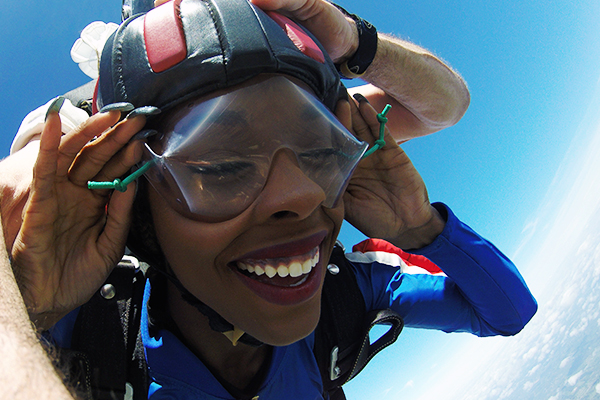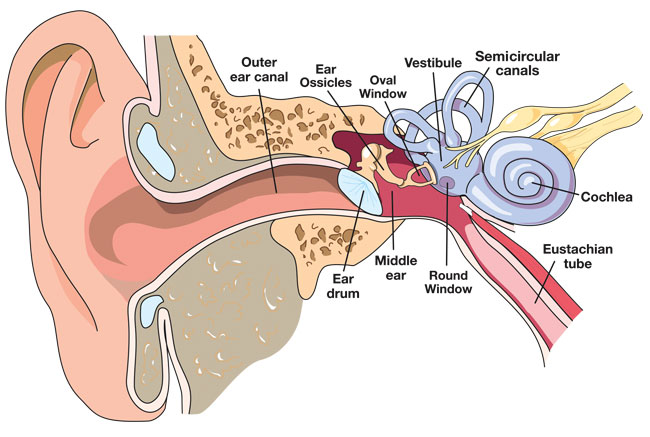Does Skydiving Hurt Your Ears?
Do you suffer from internal ear issues? Do you feel pressure or pain when driving in the mountains, swimming, or ascending or descending on a commercial plane? If you answered “yes” to any of those questions, then read on – we’ve got some info you should read before your make your first skydive!

Skydiving and Its Affect On Your Ears
Just about everyone who skydives feels pressure on their ears. How much pressure and discomfort may vary, but everyone feels it. Pressure on the ears is felt during the ascent on the flight to altitude and of course on the descent during free fall. This pressure is known as… wait for it… airplane ear! Airplane ear is also known as barotrauma, barotitis media, or aerotitis media. Usually, the pressure will subside after some time, but individuals that may have a cold and/or are experiencing strong sinus blockage may experience severe pain, moderate to severe hearing loss, ringing in the inner ear (tinnitus), vertigo, or even bleeding (yikes!).
Key Takeaway: If you have a cold with sinus pressure, your ears could be greatly affected. Be sure to reschedule your skydive! It’s not worth the risk!
Why Your Ears Hurt During a Skydive
The reason why our ears feel uncomfortable when flying or skydiving is because of air pressure. When the air pressure in the middle ear and the environmental pressure differ then it prevents the eardrum from vibrating as it normally would. Our eustachian tubes are what regulate the pressure to allow for correct balance, but when there is rapid ascent or descent (a 120 mph skydive), then the eustachian tubes can’t keep up fast enough. This slow reaction is what causes discomfort or pressure on our ears. Below are exercises skydivers routinely use to help ease the pressure and help the eustachian tubes regulate more quickly. 
How To Equalize Your Ears
The Valsalva Method
The trick to not letting the pressure build up too much and becoming uncomfortable is to “blow air out through your ears.” That sounds a bit ridiculous, but scuba divers know all about it – the technique is called equalizing or “valsalva”. Equalizing involves pinching the nose and blowing gently which forces air to move along the Eustachian tubes within your middle ear.
Another variation of this is to put your thumb in your mouth and then blowing through your mouth while maintaining the seal around your thumb. This will also bring about clearance.
The Toynbee Maneuver
The Toynbee Maneuver may seem like a great party trick, but it’s also a great way to help clear your ears. The idea with the Toynbee Maneuver is to:
- Take a sip of water
- Pinch your nose
- Swallow the water with your nose pinched
The Jaw Wriggle
The jaw wriggle is as funny as it sounds. If you think the technique involves wriggling your jaw all around, you’d be 100% correct, however, be sure to wriggle the jaw with your mouth open!
The Otovent Technique
The Otovent technique uses a simple balloon! This may be a bit hard to explain, so here’s a video of what this effective technique looks like:
A Helpful Product – The Eustachi
This product does seem to work and we thought it would be fun to show their rather unique commercial, because… why not! If you’d like to purchase the Eustachi, you can definitely do that!
Have Questions?
If you have sinus pressure issues and feel concerned about making a skydive because of it, we recommend consulting with your ear, nose, and throat (ENT) doctor. Your doctor would be the best person to advise you whether making a skydive is a good idea with respect to your medical condition. Of course, we’d be happy to answer any other questions you may have. Shoot us a message here, or call us at (770) 207-1122.
Copyright © 2024, Skydive Monroe, All Rights Reserved.
DropZone Web Design & Marketing by Beyond Marketing, LLC



